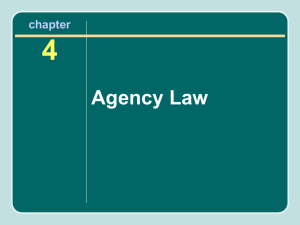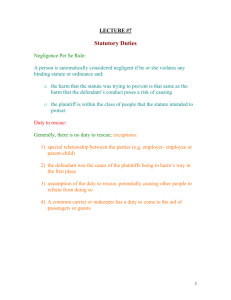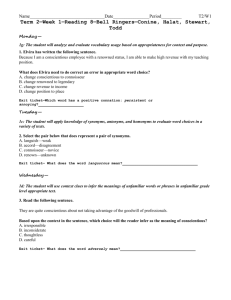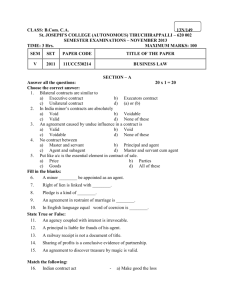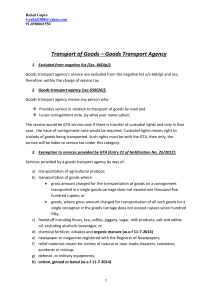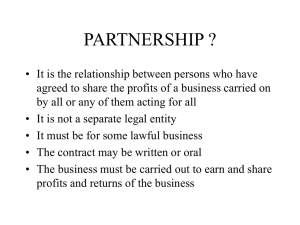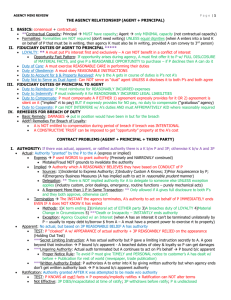Irrevocable Agency
advertisement
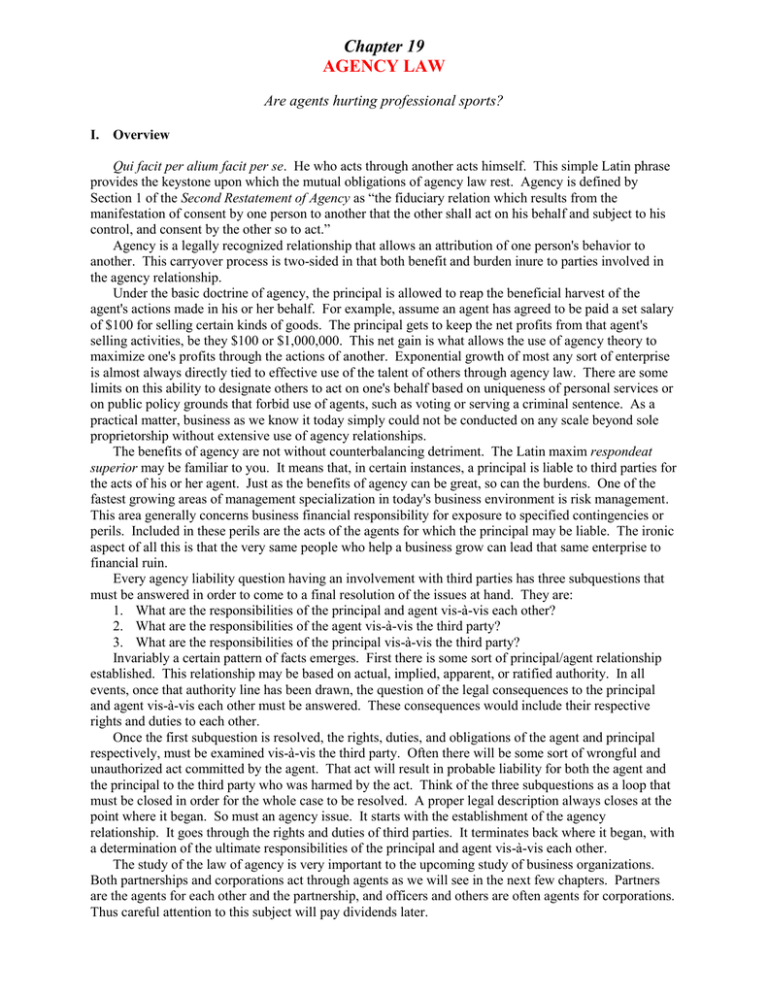
Chapter 19 AGENCY LAW Are agents hurting professional sports? I. Overview Qui facit per alium facit per se. He who acts through another acts himself. This simple Latin phrase provides the keystone upon which the mutual obligations of agency law rest. Agency is defined by Section 1 of the Second Restatement of Agency as “the fiduciary relation which results from the manifestation of consent by one person to another that the other shall act on his behalf and subject to his control, and consent by the other so to act.” Agency is a legally recognized relationship that allows an attribution of one person's behavior to another. This carryover process is two-sided in that both benefit and burden inure to parties involved in the agency relationship. Under the basic doctrine of agency, the principal is allowed to reap the beneficial harvest of the agent's actions made in his or her behalf. For example, assume an agent has agreed to be paid a set salary of $100 for selling certain kinds of goods. The principal gets to keep the net profits from that agent's selling activities, be they $100 or $1,000,000. This net gain is what allows the use of agency theory to maximize one's profits through the actions of another. Exponential growth of most any sort of enterprise is almost always directly tied to effective use of the talent of others through agency law. There are some limits on this ability to designate others to act on one's behalf based on uniqueness of personal services or on public policy grounds that forbid use of agents, such as voting or serving a criminal sentence. As a practical matter, business as we know it today simply could not be conducted on any scale beyond sole proprietorship without extensive use of agency relationships. The benefits of agency are not without counterbalancing detriment. The Latin maxim respondeat superior may be familiar to you. It means that, in certain instances, a principal is liable to third parties for the acts of his or her agent. Just as the benefits of agency can be great, so can the burdens. One of the fastest growing areas of management specialization in today's business environment is risk management. This area generally concerns business financial responsibility for exposure to specified contingencies or perils. Included in these perils are the acts of the agents for which the principal may be liable. The ironic aspect of all this is that the very same people who help a business grow can lead that same enterprise to financial ruin. Every agency liability question having an involvement with third parties has three subquestions that must be answered in order to come to a final resolution of the issues at hand. They are: 1. What are the responsibilities of the principal and agent vis-à-vis each other? 2. What are the responsibilities of the agent vis-à-vis the third party? 3. What are the responsibilities of the principal vis-à-vis the third party? Invariably a certain pattern of facts emerges. First there is some sort of principal/agent relationship established. This relationship may be based on actual, implied, apparent, or ratified authority. In all events, once that authority line has been drawn, the question of the legal consequences to the principal and agent vis-à-vis each other must be answered. These consequences would include their respective rights and duties to each other. Once the first subquestion is resolved, the rights, duties, and obligations of the agent and principal respectively, must be examined vis-à-vis the third party. Often there will be some sort of wrongful and unauthorized act committed by the agent. That act will result in probable liability for both the agent and the principal to the third party who was harmed by the act. Think of the three subquestions as a loop that must be closed in order for the whole case to be resolved. A proper legal description always closes at the point where it began. So must an agency issue. It starts with the establishment of the agency relationship. It goes through the rights and duties of third parties. It terminates back where it began, with a determination of the ultimate responsibilities of the principal and agent vis-à-vis each other. The study of the law of agency is very important to the upcoming study of business organizations. Both partnerships and corporations act through agents as we will see in the next few chapters. Partners are the agents for each other and the partnership, and officers and others are often agents for corporations. Thus careful attention to this subject will pay dividends later. II. Hypothetical Multi-Issue Essay Question John Jewelry owns a jewelry store located in a major mall in Iowa. His store is known for selling items worth no less that $5,000 each. Because he owns many other similar stores, he hires Mike Missing to manage this store. John, however, specifically instructs Mike that he is not permitted to buy any items worth more than $10 without his approval. He is to keep this agreement secret between the two of them. Having a poor memory, Mike purchases 100 diamond rings worth $15,000 each. John refuses to pay for the rings. While selling one of these rings, John accidentally trips and injures the customer buying the ring. He tripped because he was trying to balance a cup of coffee on his nose. John asks for some legal help in determining his potential liability stemming from the above facts. III. Outline Nature of Agency Agency relationships are formed by the mutual consent of a principal and an agent Principal The party who employs another person to act on his or her behalf Agent The party who agrees to act on behalf of another Agency The principal-agent relationship Employment Relationships Employer-employee A relationship that results when an employer hires an employee to perform some form of physical service Principal-agent A relationship that results when an employer hires an employee and gives that employee authority to act and enter into contracts on his or her behalf Principal-independent contractor A relationship that results when a person or business that is not an employee is employed by a principal to perform a certain task on his or her behalf. Tests include type of work, time, provision of supplies or tools or equipment, method of payment, skill, and control of manner and means. Forming the Agency Relationship—contract or ratification Express agency An agency that occurs when a principal and an agent expressly agree to enter into an agency agreement with each other. This could include a power of attorney. Implied agency An agency that occurs when a principal and an agent do not expressly create an agency, but it is inferred from the conduct of the parties Apparent agency Agency that arises when a principal creates the appearance of an agency that in actuality does not exist Agency by ratification Agency that occurs when A person misrepresents himself or herself as another’s agent when in fact he or she is not, but the purported principal eventually ratifies the unauthorized act Duties of Agents Agent’s duties (A → P) Duty of performance with reasonable care Duty of notification to the principal Duty of loyalty not to act against the principal’s interests ( self-dealing, competition, dual agency) Duty of obedience to legal instructions Duty of accountability to maintain accurate records Duties of Principals Principal’s duties (P → A) Duty of compensation for services provided Duty of reimbursement and indemnification reimburse for costs and indemnify for losses Duty of cooperation and assistance Duty to provide safe working conditions Termination of an Agency by Acts of the Parties Mutual agreement Lapse of time Purpose achieved Occurrence of a specified event Actual notice must be given to third parties previously dealt with and constructive notice to all others Termination of an Agency by Operation of Law Death of the principal or agent Insanity of the principal or agent Bankruptcy of the principal Impossibility of performance Change in circumstances (unusual) War between the principal’s and the agent’s countries Wrongful Termination of an Agency Contract Wrongful termination is the termination of an agency contract in violation of the terms of the agency contract The nonbreaching party may recover damages from the breaching party Irrevocable Agency An agency coupled with an interest is a special type of agency relationship that is created by the agent’s benefits It is irrevocable by the principal Contract Liability of Principals and Agents to Third Parties Type of Agency Liability of Agent 1. Fully disclosed known existence and identity of principal No 2. Partially disclosed known existence but unknown identity of principal Yes 3. Undisclosed unknown existence and identity of principal Yes Principal Yes Yes Yes Tort Liability of Principals and Agents to Third Parties – Principal is liable for agent’s negligent torts if acting within the scope of authority. When an agent does something during the course of his or her employment to further his or her own interests rather than the principal’s, the principal is generally not relieved of liability for minor detours but is for substantiated personal frolics. A principal is generally not liable for injuries caused by its agents and employees while they are on their way to or from work. If agent is on a dual purpose mission, the principal is generally liable if the agent is involved in an errand or other act that a principal requests of an agent while the agent is on his or her own personal business. The principal is often liable for the intentional torts of the agent committed within the scope of the agency if motivation is to promote principal’s business or if committed within work-related time or space. They are also liable for the intentional or innocent misrepresentation of an agent in the scope of authority. Liability for Independent Contractor’s Torts A principal is generally not liable for the torts of its independent contractors, with the following exceptions Special risks Negligence in the selection of an independent contractor IV. Objective Questions Terms: 1. An agency that occurs when a principal and agent agree to enter into an agency agreement with each other is called a(n) _______________ agency. 2. An agency that occurs when a principal and agent do not expressly create an agency, but it is inferred from the conduct of the parties is called a(n) _______________ agency. 3. An agency that arises when a principal creates the appearance of an agency that in actuality does not exist is known as a(n) _______________ agency. 4. An agency that occurs when (1) a person misrepresents herself as another's agent when in fact she is not and (2) the purported principal ratifies the unauthorized act is called a(n) _______________ _______________ _______________. 5. The party who employs another person to act on her behalf is the _______________. 6. An agency results if the third party entering into the contract knows (1) that the agent is acting as an agent for a principal and (2) the actual identity of the principal. This is called a _______________ _______________ agency. 7. A rule that says an employer is liable for the tortious conduct of its employees or agents while they are acting within the scope of its authority is called _______________ _______________. 8. The rule that says a principal is generally not liable for injuries caused by its agents and employees while they are on their way to or from work is called the _______________ _______________ ________________ _______________. 9. The test to determine the liability of the principal: if the agent's motivation in committing the intentional tort is to promote the principal's business, then the principal is liable for any injury caused by the tort is known as the _______________ test. 10. An _______________ _____ _______________ can be discharged at any time for any reason. True/False: 1. ____ An agency relationship must be based on consideration. That is, no agency relationship is created if the agent is not paid for his services. 2. ____ A power of attorney, which is an express agency agreement, may be established by either an oral or written agreement. 3. ____ A principal's ratification of an unauthorized contract must be by express approval. Implied consent is not sufficient to bind a principal under ratification principles. 4. ____ Constructive notice is sufficient to inform parties who dealt with an agent that the agency has been terminated. 5. ____ An employee in an employer/employee relationship is not an agent since she cannot enter into contracts for her principal. 6. ____ In a partially disclosed agency, both the agent and the principal are liable on any contract that the agent makes. 7. ____ An agent of a fully disclosed principal is liable on a contract if he does not specify the principal's name in signing the contract. 8. ____ Both agents and principals are liable for an agent's breach of the implied warranty of authority. 9. ____ A principal is not liable for the criminal conduct of his agent since the principal did not have the criminal intent to commit a crime. 10. ____ An agent is prohibited from using his agency for personal benefit even if the principal is aware of and consents to such actions. Multiple Choice: 1. Roman, an agent for Tom, has the express authority to sell Christine’s goods. Roman also has the express authority to grant discounts of up to five percent of list price. Roman sold Sidney goods with a list price of $1,000 and granted Sidney a ten percent discount. Sidney had not previously dealt with either Roman or Tom. Which of the following courses of action may Christine properly take? A. Seek to void the sale to Sidney. B. Seek recovery of $50 from Sidney only. C. Seek recovery of $50 from Roman only. D. Seek recovery of $50 from either Sidney or Roman. 2. Mean Master wanted to hire Billy Butler as his personal “man.” Generally, under the laws of agency, which of the following acts may Mean Master not hire Billy Butler to do? A. Wash, clean, and hand press his dirty jogging clothes. B. Clean out his backed up sewer line with a toothbrush. C. Brush Mean Master’s teeth bare handed. D. Have Billy serve Mean Master’s time in federal prison for employment tax evasion. 3. Kathleen Company dismissed Sabrina, its purchasing agent. It published a notice in the appropriate trade journals that stated that the Kathleen Company no longer employed Sabrina. Sabrina called on several of Kathleen's suppliers with whom she had previously dealt, and whenever she found one who was unaware of her dismissal, she would place a substantial order for merchandise to be delivered to a warehouse in which she had rental space. Sabrina also called on several suppliers with whom Kathleen had never dealt; she would present one of her old business cards to the secretary and then make purchases on open account in the name of Kathleen. Sabrina then sold all the merchandise and absconded with the money. In this situation: A. Sabrina had continuing express authority to make contracts on Kathleen's behalf with suppliers with whom she had previously dealt as Kathleen's agent if they were unaware of her dismissal. B. The suppliers who previously had no dealing with Kathleen cannot enforce the contracts against Kathleen even if the suppliers were unaware of Sabrina's lack of authority. C. Kathleen is liable on Sabrina’s contracts to all suppliers who had dealt with Sabrina in the past as Kathleen's agent. D. Constructive notice via publication in the appropriate trade journals is an effective notice to all third parties regardless of whether they had dealt with Sabrina or read the notice. 4. Worker Wendy is an employee in an employer/employee relationship with her employer, Car Parts Company (CPC). In her job, Wendy loads various car parts on a truck for delivery. CPC comes to you, its attorney, and asks about its liability with respect to Wendy. Please advise them. A. CPC is liable for any torts committed by Wendy and any contracts she enters into. B. CPC is liable for any contracts Wendy enters into, but never for any torts she commits. C. CPC is liable for any torts committed by Wendy while acting on the company's behalf. D. CPC is not liable for any torts committed by Wendy or any contracts she enters into since she is only an employee. 5. Principal Peter hires Agent Anne to act as a sales agent for his company, Complete Computers. Anne and Peter have a written agreement that states that Anne may negotiate sales contracts and receive customer payments. Although the agreement is silent on the issue, Anne also delivers the computers to her customers. Which of the following is correct regarding Anne's authority? A. Anne is an expressly appointed agent with some implied authority. B. Anne is an implied agent. C. Anne is an agent by ratification. D. None of the above. 6. Which of the following is not a duty of an agent towards the principal? A. Duty of performance. B. Duty to provide safe working conditions. C. Duty of loyalty. D. Duty of obedience. 7. Agent Amy has negotiated a contract for the sale of computer equipment to Merchant Mike. Amy's principal, Principal Pat believes that the equipment is not to be shipped until October 10. However, Mike told Amy he needed the equipment shipped on October 2. Amy does not notify Pat of this change. Consequently, the equipment is not shipped until October 10 and Mike incurs damages. Which of the following is correct? A. Amy is liable to Pat for any damages her failure to notify may have caused. B. Pat is not liable to Mike since he never knew of the changed date. C. If Amy is a gratuitous agent, she does not have a duty to notify Pat. D. All of the above. 8. Scientist Sam works for Medical Miracles (MM). During his work for MM, Sam acquires knowledge of the company's greatest technological innovation, a single dose pill that immediately replaces hair loss. The pill is known as Single Sensation. Sam leaves MM soon after acquiring this knowledge to start his own medical supplies company. Which of the following is correct? A. Sam can use his knowledge of Single Sensation for personal benefit after he leaves MM. B. Sam's use of his knowledge of Single Sensation would be a violation of Sam's duty of notification. C. Sam cannot use his knowledge of Single Sensation even after he leaves MM. D. None of the above. 9. Tests proving the existence of independent contractor status include: A. Control of manner and means by employee. B. Provision of supplies by employee. C. Unskilled nature of work. D. None of the above. 10. Agent Arnold negotiates a contract with Theo on behalf of Principal Peter. Theo is aware that Arnold is working for a principal. However, Theo does not know that Peter is Arnold's principal. Theo and Arnold reach agreement on the contract and sign it. Arnold signs as follows: Agent Arnold, agent. Regarding liability on the contract, which of the following is correct? A. Arnold is liable on the contract. B. Peter is liable on the contract. C. Both of the above. D. None of the above. Arnold is not liable since Theo knew he was only an agent, and Peter is not liable since his name is not on the contract. V. Answers to Objective Questions Terms: 1. Express. This is the most common form of agency. They can be either oral or written unless the Statute of Frauds stipulates that they must be written. 2. Implied. The extent of the agent's authority is determined from the facts and circumstances. These can include industry custom, prior dealings between the parties, or any other factors the court may deem relevant. 3. Apparent. This agency is also sometimes called an agency by estoppel. If the agency is established, the principal is estopped from denying the relationship. It is the principal’s actions (or lack thereof) that can create an apparent agency. 4. Agency by ratification. Note, at the time of the purported agency, there was, in fact, no agency in existence. It is the act of ratification (acceptance) by the principal that renders him or her now liable for the acts of the agent. 5. Principal. Most principals are known as employers although that has its own set of special characteristics. 6. Fully disclosed. In a fully disclosed agency, the contract is between the principal and the third party and the agent is not generally liable. 7. Respondant superior. This term is derived from the Latin term meaning: "Let the master answer." The doctrine represents the burden that comes to the principal where he or she can also reap the benefits of the agent's act. 8. Coming and going rule. As the labor market adjusts to more off-site work situations through the use of electronic networking, the definition of this employer's defense theory will become more difficult. 9. Motivation. If the agent's motivation in committing the intentional tort was personal, then the principal is not liable. 10. At-will employees. Employees with no contract that can be discharged at any time for any reason. True/False: 1. False. An agency relationship may be created even without consideration. Such an agency is known as a gratuitous agency. 2. False. A power of attorney, which is an express agency agreement, must be established by a written agreement. An oral agreement is not sufficient to establish a power of attorney. 3. False. Implied consent may be shown by the principal's conduct and is sufficient to show the principal's intent to ratify an unauthorized contract. 4. False. Parties who have dealt with an agent must be given direct notice of termination of the agency. Constructive notice is sufficient for parties who have no knowledge of the agency. 5. True. An agent is empowered to enter into contracts for her principal. An employee in an employer/employee relationship does not have this power. 6. True. Since the actual identity of the principal is not known to the third party in a partially disclosed agency, both the agent and the principal are liable on such a contract. 7. True. Even though agents of fully disclosed principals are not usually liable on contracts for the principals, if the agent does not specify the principal's name in signing the contract, he may be held liable on it. 8. False. Only an agent is liable for an agent's breach of the implied warranty of authority. 9. True. The principal cannot have the requisite mens rea to be convicted of a crime that the agent committed and the principal was not involved in. 10. False. An agent may personally benefit from his agency if the principal is aware of such conduct and consents to it. Multiple Choice: 1. C. Roman exceeded his express authority when he granted the ten percent price discount to Sidney; therefore, Roman would be liable to Christine for the amount of damage caused by Roman’s breach, $50. A, B, and D are incorrect because Sidney had not previously dealt with Roman or Tom; therefore, Roman was acting with apparent authority when he granted the ten percent price discount to Sidney. Consequently, Christine would not be able to void the sale or recover from Sidney. 2. D. Public policy prevents Mean Master from trying to have Billy Serve his sentence. He can ask Billy to do A, B, and C, assuming no labor or minimum wage laws are broken. Billy might want to consider another line of work. 3. B. When the agency is terminated, the principal must notify customers of the agent's termination. Publication of the notice in the trade journal (constructive notice) precluded Sabrina's apparent authority to those suppliers who previously had no dealings with Kathleen. A is incorrect because Sabrina did not have continuing express authority. However Sabrina did have continuing apparent authority on behalf of suppliers with whom she had previously dealt if they did not know of her dismissal. C is incorrect because Kathleen is not liable on the contracts with those suppliers who read 4. 5. 6. 7. 8. 9. 10. the published notice and had actual knowledge of the discharge that terminated Sabrina's apparent authority. D is incorrect because constructive notice by publication is sufficient notice only for the third parties who had not previously dealt with Sabrina. C. An employer in an employee/employer relationship is liable for the torts of its employees if an employee acting on the principal’s behalf committed the tort. A is incorrect because CPC is not liable for any contracts Wendy enters into since she has no authority to do so. B is incorrect because CPC is not liable for contracts Wendy enters into for the reason stated above. In addition, CPC is liable for torts Wendy commits while acting on its behalf. D is incorrect because CPC is liable for some torts even though she is only an employee in an employer/employee relationship. A. Since Anne and Peter have an express agreement regarding Anne's agency for Peter, Anne is an expressly appointed agent. In addition, expressly appointed agents may also have implied or apparent authority to carry out certain activities which are not expressly stated. Here, Anne's authority to deliver computers is implied, not expressed. B is incorrect because the agreement between Anne and Peter is express, not implied. C is incorrect because there is no indication of ratification here. Also, Anne clearly has an express agency agreement. B. The duty to provide safe working conditions is owed by the principal to his or her agent(s). A, C, and D are duties owed by the agent to his or her principal. A. Amy has breached her duty to notify Pat. Therefore, she is liable for any damages resulting from this breach. B is incorrect because Pat is liable to Mike since Amy's knowledge of the changed date is imputed to Pat. C is incorrect because even a gratuitous agent must perform the necessary duties owed by an agent to a principal. C. Sam owes a duty of loyalty to MM not to use its trade secrets or technological innovations even after Sam leaves the company. Such a use would be a misuse of confidential information. A is incorrect because this is a breach of the duty of loyalty. B is incorrect because use of the knowledge is a breach of the duty of loyalty, not the duty of notification. B. The others would indicate an employee relationship. Control seems to be the key factor. C. Both A and B are correct because both an agent and a principal are liable on a contract in a partially disclosed agency situation. D is incorrect because an agent may be held liable in spite of his agency capacity, and a principal is always liable for the authorized contracts of his agents. VI. Answers to Essay Question John is liable for the rings under the theory of apparent authority. Secret limitations between a principal and an agent have no effect when an agent has been held out as such by the principal. Such was the case here since Mike was John’s store manager performing his normal managerial duties as far as others could tell. The doctrine of respondeat superior holds that a principal is liable for the negligent torts of an agent if committed within the scope of the agency. Such seems to be the case here and, thus, John is liable for the customer’s injuries.
